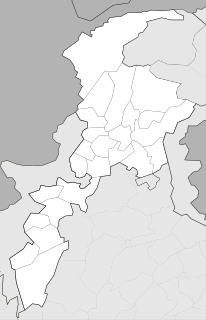
Ghulam Ishaq Khan, was a Pakistani bureaucrat who served as the 7th President of Pakistan, elected in 1988 until his resignation in 1993.
The Marwat is a Pashtun tribe, a branch of the Lohani tribe and belong to Lodi section of the Mati Afghans, located primarily in Lakki Marwat District, parts of Dera Ismail Khan District, some villages of Tank district and in the Katawaz area of Afghanistan. The Marwats are also known as Spin Lohani, and their most closely related kin are other Lohani tribes like Miya Khel, Daulat Khel and Tatur. In the Afghan dynasty of Hind (1451-1526), Lohanis were the most powerful among the Lodi Afghans and were in possession of one quarter of jagirs in India. The Marwats were named for their ancestor Marwat Khan Lodi.
Asfandyar Wali Khan is a Pakistani politician. A democratic socialist, he is President of the Awami National Party in Pakistan.

Lakki Marwat or Lakki is the headquarters of Lakki Marwat District in Khyber-Pakhtunkhwa province of Pakistan.

Salim Saifullah Khan is a Pakistani politician and President of a faction of the Pakistan Muslim League and a Senator of Pakistan and Chairman of Pakistan's Senate Foreign Relations, Kashmir Affairs and Gilgit Baltistan Committee. He is a Khan, or Lord of the Marwat Tribe. He has in the past remained Finance Minister, Industries, Khyber-Pakhtunkhwa. He was also deputy opposition leader in Khyber-Pakhtunkhwa Provincial assembly in 1993. Salim Saifullah Khan has held portfolios of Housing, Commerce, Petroleum and Inter-Provincial Coordination as a Federal Minister. He has most recently served as the Chairman of Senate's Foreign Relation Committee. Presently Salim Saifullah khan is Honorary Consul General of Turkey, at Peshawar. Recently elected President Pakistan Tennis Federation on 12 December 2014.
Anwar Saifullah Khan is a Pakistani politician and industrialist. As a member of the Pakistan Muslim League (Junejo), he served in Prime Minister Nawaz Sharif's cabinet as Federal Minister of Environment and Urban Affairs from 1990 to 1993 and as Federal Minister for Petroleum and Natural Resources from 1994 to 1996 in coalition with Prime Minister Benazir Bhutto. He was also elected to the Senate from Khyber Pakhtunkhwa in 1990, serving until 1997.

Dil Jan Khan is a former Senior Vice President of International Narcotics Control Board of the UN. Ethnically, he is a Marwat and was born in District Lakki Marwat of Pakistan. He joined Police Service of Pakistan on January 21, 1961. Dil Jan Khan has also worked as an Inspector General of Police and on a number of other important positions as Interior Secretary of Pakistan, Federal Secretary for State and Frontier Regions (SAFRON), and as Commandant of the Frontier Constabulary.
Muhamad Yusuf Khan Khattak best known as Yusuf Khattak, was a Pakistani politician, left-wing intellectual, lawyer, and noted Pakistan Movement activist from Khyber Pakhtunkwa.
Abdul Qayyum Khan Kashmiri was a major figure in British Indian and later Pakistan politics, in particular in the North-West Frontier Province, where he was deputy speaker of the provincial assembly, Chief Minister and served as Interior Minister of Pakistan in the central government from 1972 to 1977.
Sardar Abdur Rashid Khan was a senior police officer from the Khyber-Pakhtunkhwa province and cabinet minister in Pakistan.
Gohar Ayub Khan, is a Pakistani politician, business oligarch, retired army officer, and conservative figure of the Pakistan Muslim League, who held ministerial positions during the administration of Prime Minister Nawaz Sharif.

Edwardes College is the oldest higher education institution in Peshawar, the capital of Khyber Pakhtunkhwa Province in the Islamic Republic of Pakistan. The college, affiliated with the University of Peshawar, has about 3,000 students in sciences, arts and humanities, business administration, higher national diploma and computer sciences.
Anwar Kamal Khan Marwat Mina Khel was a Pakistani Politician.
Hayat Mohammad Khan Sherpao, simply known as Hayat Sherpao, was a notable left-wing intellectual and socialist, serving as the fifteenth Governor of North West Frontier Province of Pakistan, as well as vice-chairman of Pakistan Peoples Party. Sherpao held important executive offices, including served as the Interior minister and had held a number of provincial ministries of the Khyber-Pakhtunkhwa Province.
Justice Shah Nawaz Khan, was a Mina Khel, Marwat, from Lakki Marwat District, Pakistan.
Justice (Retd.) Mr. Qazi Muhammad Farooq is Chief Election Commissioner of Election Commission Of Pakistan.
Dost Muhammad Khan is a Pakistani jurist who remained a senior justice of the Supreme Court of Pakistan from 1 February 2014 to 20 March 2018. Previously, he served as Chief Justice of the Peshawar High Court from 17 November 2011 to 31 January 2014. He refused to take oath under the Provisional Constitutional Order (PCO) 3 November 2007 and rejected all kinds of offers.










